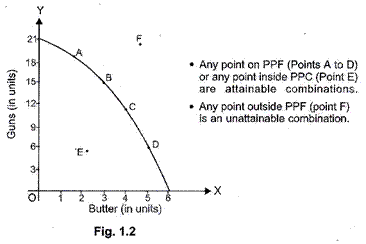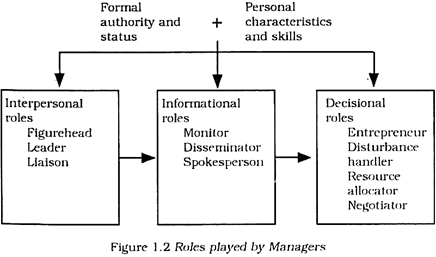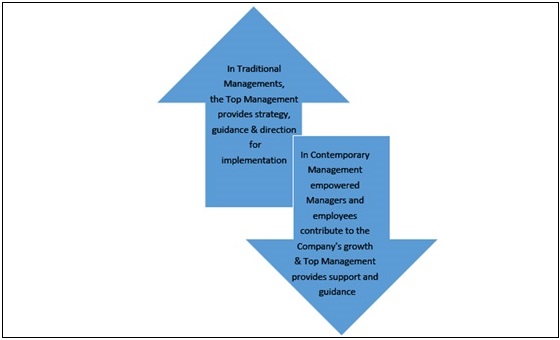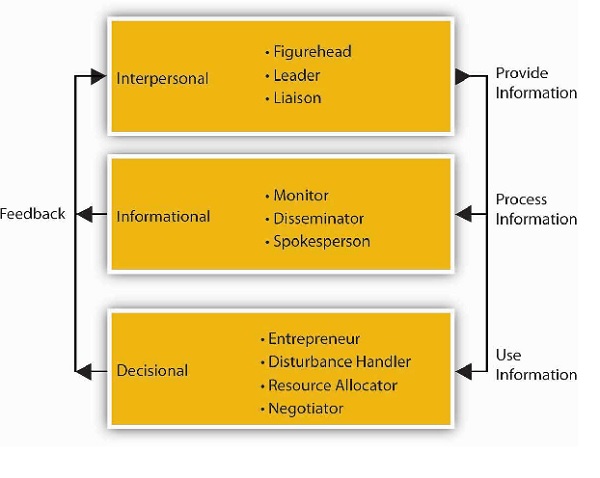What is the role of the manager
What is the role of the manager
What is the role of a manager
Different managers perform at different levels and require different skills. To meet the demands of performing their functions, managers assume multiple roles. A role is an organized set of behaviors. Henry Mintzberg has identified ten roles common to the work of all managers. The ten roles are divided into three groups: interpersonal, informational, and decisional.
Interpersonal Roles
The three interpersonal roles are primarily concerned with interpersonal relationships. By assuming these roles, the manager also can perform informational roles, which, in turn, lead directly to the performance of decisional roles.
In the figurehead role, the manager represents the organization in all matters of formality. Some examples of the figurehead role include a college dean who hands out diplomas at graduation, a shop supervisor who attends the wedding of a subordinate’s daughter, and the CEO who cuts the ribbon on a new office building.
The leader role defines the relationships between the manger and employees. It involves directing and coordinating the activities of subordinates. It may involve – hiring, training, motivating, and encouraging employees. First-line managers, in particular, feel that effectiveness in this role is essential for successful job performance. 1
The liaison role involves managers in interpersonal relationships outside of their area of authority. This role may involve contacts both inside and outside the organization. The top-level manager uses the liaison role to gain favors and information, while the supervisor uses it to maintain the routine flow of work.
Informational Roles
As monitor, the manager constantly looks for information that can be used to advantage. The information gathered might be competitive moves that could influence the entire organization or the knowledge of whom to call if the usual supplier of an important part cannot fill an order.
In the disseminator role, the manager distributes to subordinates important information that would otherwise be inaccessible to them. Example: The president of a firm may learn during a lunch conversation that a large customer of the firm is on the verge of bankruptcy. Upon returning to the office, the president contacts the vice president of marketing, who in turn instructs the sales force not to sell anything on credit to the troubled company.
In the role of spokesperson, the manager disseminates the organization’s information into its environment. Thus, the top-level manager is seen as an industry expert, while the supervisor is seen as a unit or departmental expert.
Decisional Roles
According to Mintzberg, there are four decisional roles the manager adopts. In the role of entrepreneur, the manager tries to improve the unit. For example, when the manager receives a good idea, he or she launches a development project to make that idea a reality.
In the disturbance handler role, the manger deals with threats to the organization. Examples: An emergency room supervisor responds quickly to a local disaster, a plant supervisor reacts to a strike, etc.
The resource allocator role places a manager in the position of deciding who will get what resources. These resources include money, people, time, equipment, and information. This is one of the most critical decisional roles. Example: A college dean must decide which courses to offer next semester, based on available faculty.
Managers spend a great deal of their time as negotiators, because only they have the information and authority that negotiators require. The negotiations may concern work, performance, objectives, resources, or anything else influencing the unit. Examples: A company president works out a deal with a consulting firm; A front line supervisor may negotiate for new typewriters.
What Is a Manager?
Updated August 3, 2022
Managers play a hugely important role in the workplace. They oversee projects, ensure that businesses are working effectively and are responsible for ensuring that the right teams are in place.
They will likely have significant responsibility for fiscal policies and general operations; they will also need to motivate individuals to work to the best of their ability.
It comes as no surprise that managers need to have a wide range of skills to be successful.
But what are these skills and what does a manager do? This article will look at the role of the manager and help you understand why they play such an important role.
What Is a Manager?
There are many different types of managers, and each one will have distinct roles and responsibilities.
Many companies choose to operate via a vertical line management structure.
This is where you may have a CEO or management team at the top, with various board members and/or senior C-suite executives reporting directly to them.
Each board member may have their own team/division, complete with middle managers who may have line managers or team leaders underneath them.
Imagine a reversed family tree, with branches spreading out downwards indicating the different teams reporting upwards to their managers. Vertical versus horizontal management is discussed below.
Here is a short breakdown of the role of each manager:
Top-level managers/C-suite executives. These managers take overall responsibility for the running of the company. They are responsible for the wider business strategy and ensuring that it complies with all relevant rules and legislation. They focus on business growth, acquisitions, investments, product portfolios and external partnerships. They may be seen as the face of the company – for example, Jeff Bezos from Amazon.
Middle managers. They are responsible for specific departments. Whilst they do need to consider wider business strategy, they take direction on this from their senior teams, leaving them to focus on managing their day-to-day tasks. Middle management plays an important role – it is the link between the on-the-ground workers and the senior management teams.
Line managers/team leaders. These are usually the first rung on the managerial ladder. These are the people who are responsible for the day-to-day running of the operation but, unlike middle managers, do not need to consider the wider perspectives. They may be responsible for recruitment within their teams and the operational tasks involved in ensuring that work is completed on-time and on-budget.
What Key Skills Should a Manager Have?
To be successful, managers need to have a wide range of skills.
They will have likely begun their career in entry-level positions and worked their way up the career ladder. This means that they will typically have frontline experience of working on the ‘shop floor’ but will also have gained wider experience and capabilities through additional training and academic qualifications.
Here are some of the essential skills that great managers need to have:
Communication. What sets a great manager apart from a good manager is their ability to communicate effectively with their staff. A manager must be able to clearly explain their corporate vision whether it is an ambitious growth plan led by top-level managers or a specific job task explained to junior staff. Knowing how to talk to people can play an important role in maintaining motivation and improving a co-worker’s performance.
Critical thinking. Managers need to listen to what is being said and, more importantly, understand what is not being said. They need to have the analytical and critical thinking skills to think beyond the initial problem or situation and establish ways to overcome the issue. As managers work their way up, this becomes a more conceptual skill. They need to understand the wider implications of their decisions, which may have long-lasting consequences for the business.
Decision making. Managers are responsible for all of the decision-making in the business, from choosing which staff member will do which task to recruitment plans and spotting expansion opportunities. Whether you are a line manager, team leader or a C-suite executive, your days will be spent making decisions that may have lasting effects on a business.
Delegation. One of the hardest skills for any manager is learning how to delegate. It may be tempting to simply do it all yourself, but success will rely on delegating tasks or even decisions to other people, while not micromanaging.
Financial acumen. As you progress in your managerial career, you will likely take on more fiscal responsibility. The manager’s role will include responsibility for budgets, from small projects through to large departments. You must understand cash flow and provide business cases for investment in new opportunities. Much of your time will be spent evaluating return on investments and understanding how to make money.
Leadership. Managers need to be inspiring. They need to be able to lead effectively, through calm, collected choices and encourage people to want to work for them. Great managers are those who can lead others to work to the best of their ability and work as part of a team.
Project management. To get a higher-level managerial position, you will need to have demonstrable proof of how you can take a project to completion from start to finish. You will need to show you can put the right teams in place, trust them to do the work you delegate and that you also know when to get involved to provide help and support.
Technical proficiency. This is an often overlooked managerial skill, but you need to have a deep knowledge of your profession. You cannot manage a team of investment bankers if you do not have the vaguest idea of what investment banking requires. If you have worked your way up from the bottom, you should understand what your business does, but if you are new to a company, you need to show your knowledge. For example, a pharmaceutical manager would need to have a scientific background to fully understand the business.
How Can You Get the Required Managerial Skills?
In many cases, these skills are built on years of experience and from working with and learning from others. However, as you progress in your career and the stakes become much higher, you may find that you benefit from additional training and academic qualifications to help you become a better manager.
For example, you may wish to enroll in an MBA where you can improve your theoretical knowledge about specific specializations and learn from peers around the world.
What Roles and Responsibilities Do Managers Have?
Having managerial skills is good but they also need to be put into practice. Here are some of the wide variety of tasks and responsibilities a manager may be expected to perform in their job role:
Ensuring smooth operations. As a manager, you take full responsibility for ensuring that the day-to-day operations of the business are functioning effectively within your remit. You will be responsible for budgets, financial responsibilities and ensuring that your cash flow remains positive. This may include writing a business case for any investment into new products, services or technologies that can be used to help you grow your business.
Collaborating with HR. Working closely with your HR team to help identify recruitment needs and training opportunities is important in a managerial role. You will be involved in staffing issues, from hiring to training, and setting KPIs (Key Performance Indicators) and achievable targets. You could also be heavily involved in the career development of your staff, helping them develop new skills and progress their abilities with the goal of improving your teams.
Goal setting. To facilitate business growth, you will have to set a wide range of short-term and long-term goals that will keep you motivated and on-track. Establish what is achievable for your team’s existing capabilities and then, in conjunction with training, push beyond with realistic ambitions. You will have to write strategic reports outlining your achievements and showing an understanding of your strengths and weaknesses.
Communicating with others. Great managers cannot work in silos, keeping their cards close to their chest and not sharing information with others working towards a common goal. The role of the manager is to be an effective team player, leading by example. They need to show that they can motivate and inspire, while also recognizing achievements from individuals and rewarding them accordingly. They need to collaborate and work closely with their specific teams as well as communicating upwards along the managerial chain. Taking responsibility for clear communication, managers ensure everyone is working towards the same goal regardless of their levels of seniority and expertise.
Vertical Versus Horizontal Line Management
As previously mentioned, many companies operate via a vertical line management structure. This is beneficial in areas where employees want to see a clear hierarchy and career progression pathway. It can be effective because it allows individuals to flourish in their roles and employees can work to their strengths.
But there is a risk that vertical structures become too hierarchal. Those at the top may be too far removed from the workforce and unaware of the practicalities and restrictions that lower-level staff may be facing.
If it has been many years since they were ‘on the shop floor’ then they may be operating from out-of-date knowledge.
In contrast, some organizations prefer a flatter, more horizontal line management structure.
This means that there are fewer managerial layers and individual employees can have greater responsibility and authority.
There is often an open-door policy in the workplace and communication flows much easier.
Junior workers are encouraged to approach senior managers, allowing them to share ideas and knowledge and remain motivated to work for company goals.
However, this approach also has its drawbacks as people may struggle to see a clear career path or feel that they are being asked to work in ways where they lack the relevant experience.
What Are the Different Management Styles?
As you begin your role as a manager, you may need to decide what your managerial style will be.
This will determine your way of working, the way that you delegate and communicate with others, and the way that you manage your staff.
There are no right or wrong managerial styles. Some styles may suit some professions more than others, and some managers will be able to adopt different approaches with different teams of individuals.
The sign of a good manager is knowing how to work with employees to get the best out of them.
Although there are many different management styles available, they broadly split up into three distinct categories – autocratic, democratic and laissez-faire.
This is an extremely bullish style of management. It focuses on the decision-making and communication coming directly from top-level managers, often with little regard for those expected to perform the tasks.
Employees are often set distinct goals and performance levels are heavily monitored, with little room for creativity or exploration of different ways of working.
Although it may sound like a negative way of working, autocratic management can be extremely effective. It can prioritize fast decision-making processes, and all employees know exactly what they need to do and when.
In some cases, a manager may choose to use persuasive discretion to explain any roles or processes to employees. They may take the time to involve teams in the decision-making criteria which can improve motivation and participation. However, the result is the same: the decision comes directly from the top-level management structure.
In contrast, a democratic management style means that there is more communication and collaboration up and down the vertical company structure.
Employees at all levels may be welcome to submit ideas and suggestions and will be heavily involved in helping to improve business success.
Although the specific manager will take full responsibility for any products/processes/projects, they will collaborate with team members to work as effectively as possible.
This style of management is often used when the manager needs to rely on the individual skill sets of team members.
For example, marketing managers may often involve entire teams to generate campaign ideas. The manager’s role will be to retain responsibility for the overall project management, but they will likely trust individuals to be involved in campaign creation and delivery.
It can be a far more effective style of management. This is because individual employees will feel respected and motivated, but it can be costly. Time efficiency could be lost due to the time it takes to involve staff in decisions, and it can also be difficult to ensure that every person feels valued and listened to.
This is a unique style of management. It requires the total trust of the manager in their team to simply get on with the job.
Laissez-faire managers tend to step back from day-to-day management and rely on individuals to work to their ability with minimal supervision.
Many smaller firms may use this style of management because it allows people to work at their own pace, yet they can ask a manager for help when needed.
The role of the manager may be to focus solely on delegation and communication. Or they may just share an outline of what they need employees to do and give them the freedom to get on with it.
For some teams, this is a highly effective way of working. It can improve creativity and collaboration and some workers may flourish with the freedom of working to the best of their ability.
However, inexperienced workers may struggle to progress, and a lack of direction can lead to internal conflicts or tension between team members.
How to Be a Great Manager
Here are a few tips on how you can ensure that you are the best manager that you can be:
Step 1. Take Inspiration From Others
Think back to anyone you have worked with or been managed by and what their strengths and weaknesses were.
Try and consider your own individual working preferences – do you require continual monitoring and evaluation or do you crave freedom and creativity?
In your role as a manager, try to think about what you need to work as effectively as possible.
Step 2. Have Confidence in Your Abilities
If you are listening to other colleagues, you must remember that you are in charge. You need to feel confident in your decision-making criteria and believe in yourself.
With this confidence, you can build trust with your employees and they will have greater respect for you.
Step 3. Take Your Time to Develop Your Managerial Style
Each team will have their ways of working and if you are coming in new to a new role as a manager, you need to take time to see how things function before you implement any changes.
You need to be adaptable; what may have worked well in one managerial role may not be as efficient in a new company with new people with different skills.
You may also need to offer different approaches for individuals – some employees may be hugely competitive and responsive to reward schemes. Others may need a more nurturing manager who can give them a supportive pat when needed.
What Does a Managerial Career Path Look Like?
The role of a manager is varied, and the career path will change depending on your profession. But there are still some similarities between managers everywhere.
Here is an outline of how you could perceive your managerial career path:
Before You Apply for Your First Role as a Manager
Suggested experience: 3 to 5 years in your chosen profession before considering management.
If you feel ready to take your first step into management, it’s time to think about what technical skills you have and how you can share this knowledge and information with more junior colleagues.
If you are confident that you have the right skills for the job, try asking a respected colleague to act as a mentor. They can help you navigate the jump from being responsible for your own workload to being responsible for an entire team or large project.
Many people start their managerial careers by starting at the bottom and working their way up. They may have several years’ experience and a proven track record of being good at what they do. They understand how they can make the most of their experience on their management resume.
When it comes to applying for your first role as a manager, take a look at the job description and establish if there are any areas where you may need to gain new knowledge or specific accreditations and/or professional licenses.
Once you know what credentials you need, you can speak to your existing employer to find out if they would sponsor you to gain these accreditations/qualifications to help you achieve your ambitions.
Your First Job as a Manager
Suggested experience: Allocate 2 to 3 years for your first management job, giving you ample opportunity to learn the ropes.
At the start of your management career, it is important to be a strong team player.
If you have been promoted internally, your colleagues will know that you are new to management. You will need to consider your transition period – not just for you in your role, but also for your colleagues, who may have worked their way up the career ladder alongside you.
At this stage of your career, you may be using theoretical knowledge to inform your managerial style. This is because you will not yet have discovered a way of working that suits you.
You may want to take a democratic approach to management; this will give you time to judge your style whilst allowing others to collaborate with you effectively.
As you start to become more experienced, you will gain more confidence in recommending specific ways of working and be able to focus more on managerial tasks such as report writing and employee management.
To enhance your management style, you may wish to speak to your HR team about securing management training opportunities that will increase your core competencies.
Moving to Middle Management
Suggested experience: Allocate 5 to 10 years within middle management before taking that next step up.
After a few years, you may start to think about your short-term and long-term career goals.
Are you happy to stay as a line manager/team leader, or are you looking for new challenges?
This could be about progressing into middle management/top-level management or it could be about moving into new manager roles elsewhere. Make a career plan and decide whether you need to consider any postgraduate training.
You will be ready to move to a more senior position if you:
Stepping up to C-Suite Management
Suggested experience: You may need at least 15 to 20 years’ professional experience before you make this step.
Many middle managers are keen to progress into board-level job roles and it is easy to see why:
At this stage of your career, you may benefit from further postgraduate training. Many people are drawn to qualifications such as EMBAs or PhDs which can help you to improve your academic knowledge and work alongside peers from around the world.
Suggested experience: You may need at least 15 to 20 years’ professional experience and technical proficiency.
If you are not sure about stepping up to board-level management, consider a career path as a management consultant.
This is where you can use your existing knowledge to help other business leaders improve their businesses.
As an independent voice, you can assess an organization’s strengths/weaknesses and help them identify areas for improvement. You can use your knowledge of different technologies or processes and help businesses understand how they can make financial savings whilst also increasing efficiency.
This is a hugely varied job role, and many people are drawn to it as it can offer a greater variety of work along with a better work-life balance.
This article has helped you to understand the specific role of a manager and what skills are required.
A manager helps a business function as effectively as it should and, as a result, managers need to have a distinct skill set beyond the technical proficiencies of a particular profession.
Not everyone is suited to management; more of your time will be spent away from what you are trained to do and you will spend much more time focusing on administrative tasks.
However, it is a role where you can take greater responsibility and directly impact your business success as well as one with attractive pay and benefit opportunities.
Was this article helpful?
You might also be interested in these other WikiJob articles:
Or explore the Jobs & Careers / Jobs by Major sections.
Role of Manager in an Organization
A manager’s job is very crucial in an organization. He is a planner, coordinator, producer and a marketer. The success of an organization will depend upon the caliber of the manager in utilizing the resources for achieving business goals. A manger is a pivotal figure in the task of creating wealth. There are rapid changes in technology, methods of production, marketing techniques, financial set up and the manager should be competent enough to cope with the changes.
Meaning:
A manager is a person in the organization who directs the activities of others. The managers perform their work at different levels and they are called by different names. The first line managers are usually called supervisors or in a manufacturing they may be called foremen. Middle level mangers include all levels of management between the supervisory level and the top level of the organization.
These managers may be called functional managers, plant heads, and project managers. Near the top of hierarchy, there may be top managers who are responsible for making organizational decisions and setting policies and strategies that affect all the aspects of the organization. These persons may be called vice-president, managing director, chief executive officer or chairman of the board etc.
Managerial Functions:
A manager has to perform functions like planning, organizing, staffing, directing and controlling. All these functions are essential for running an organization smoothly and achieving enterprise objectives. Planning is required for setting goals and establishing strategies for coordinating activities.
Organization helps in determining what tasks are to be done, how to do them, how to group the tasks and where decisions are to be made. Staffing function is essential for employing various types of persons and performing various activities like training, development, appraisal, compensation, welfare etc.
The directing function requires giving instructions and motivating sub-ordinates to accomplish their goals. A manager has to perform the controlling function for monitoring activities to ensure that they are being accomplished as planned and correcting any significant deviations.
Managerial Skills:
A manager has to perform a number of jobs. It necessitates that a manager should have proper skills to perform different jobs.
Henry Fayol put the qualities required by managers into the following categories:
(i) Physical – health, vigour, address.
(ii) Mental – ability to understand and learn; judgement, mental vigour and adaptability.
(iii) Moral – energy, firmness, willingness to accept responsibility, initiative, loyalty, tact, dignity.
(iv) Educational – general acquaintance with matters not belonging exclusively to the function performed.
(v) Technical – peculiar to the function.
(vi) Experience – arising from the work proper.
Robert L. Katz conducted research during early 1970’s and found that managers need three essential skills or competencies ; technical, human and conceptual. He also found that the relative importance of these skills varied according to the manager’s level within the organization.
Technical Skills:
A manager must have the necessary technical skills or the ability to work with the resources, tools, techniques, procedures etc. First line managers as well as many middle managers have involved in technical aspects of the organization’s operations. Technical skills include knowledge of and proficiency in certain specialized such as engineering, computers, finance or manufacturing. Even though the need for technical skills is less when a manager moves higher in hierarchy but still technical proficiency helps in taking decisions.
Human Skills:
It is the ability to work well with other people both individually and in a group. Managers with human skills can get best out of the people working with them. They know how to communicate, motivate, lead and inspire enthusiasm and trust. These skills are needed by managers at every level but top managers need them the most.
Conceptual Skills:
Conceptual skills are the ability to integrate and coordinate various activities. Managers must have the ability to think and to conceptualize about abstract solutions. They must be able to see the organization as a whole and the relationships among its various subunits and to visualize how the organization fits into its broader environment. Conceptual skills are helpful in decision-making. Since all managers have to take decisions so these skills are essential for all managers but these become more important as they make up the organizational hierarchy.
These skills can be depicted in a diagram:
Qualities of a Manager:
A manager has to undertake a number of functions from planning to controlling. He has to take decisions for every type of activity. The decisions of the manager influence the working of an organization.
He should have the following qualities so for performing his work properly:
1. Education:
A manager must have proper educational background. These days managers are supposed to have management education, besides other educational qualifications. Education not only widens mental horizon but also helps in understanding the things and interpreting them properly. The knowledge of business environment is also important for dealing with various problems the organization may face.
2. Intelligence:
A manager has to perform more responsibilities than other persons in the organization. He should have higher level of intelligence as compared to other persons. Intelligence will help a manager in assessing the present and future possibilities for the business. He will be able to foresee the things in advance and take necessary decisions at appropriate time.
3. Leadership:
A manager has to direct and motivate persons working in the organization. He will provide leadership to subordinate. The energies of the subordinates will have to be channelize of properly for achieving organizational goals. If a manager has the leadership qualities then he can motivate subordinates in improving their performance and working to their full capacity for the benefit of the organization.
4. Training:
A manager has to acquire managerial skills. These skills consist of technical skills, human skills and conceptual skills. These skills have to be acquired through education, guidance, experience etc. These skills are needed for all levels of managers.
5. Technical Knowledge:
A manager should have technical knowledge of production processes and other activities undertaken in the enterprise. He will be in a better position to inspect and guide if he himself has a knowledge of those activities.
6. Maturity:
A manager should have mental maturity for dealing with different situations. He should be patient, good listener and quick to react to situations. He has to take many awkward decisions which may adversely affect the working if not taken properly. He should keep calm when dealing with subordinates. All these qualities will come with mental maturity.
7. Positive Attitude:
Positive attitude is an asset for a manager. A manager has to deal with many people from inside as well as from outside the organization. He should be sympathetic and positive to various suggestions and taken humane decisions. He should not pre-judge the things and take sides. He should try to develop good relations with various persons dealing with him. He should understand their problems and try to extend a helping hand.
8. Self-confidence:
A manager should have self- confidence. He has to take many decisions daily, he may analyze the things systematically before taking decisions. Once he takes decisions then he should stick to them and try to implement them. A person who lacks self-confidence will always be unsure of his decisions. This type of attitude will create more problems than solving them.
9. Foresight:
A manager has to decide not only for present but for future also. There are rapid changes in technology, marketing, consumer behaviour, financial set up etc. The changes in economic policies will have repercussions in the future. A manager should visualize what is going to happen in future and prepare the organization for facing the situations. The quality of foresight will help in taking right decisions and face the coming things in right perspective. In case the things are not rightly assessed then the organization may face adverse situations.
Role of the Manager:
A role is concerned with the behaviour pattern of a manager within an organization. Henry Mintzberg did a careful study of five chief executives at work in the late 1960’s. He discovered that the role of a manager is quite different from the notions held at that time. For instance, the prominent view at that time was that managers were reflective thinkers who carefully and systematically processed information before taking decisions.
Mintzberg found that his managers were engaged in a large number of varied, un-patterned, and short-duration activities. There was little time for reflective thinking because managers encountered constant interruptions. Mintzberg provided a categorization scheme for defining what managers do based on actual managers on the job. He concluded that managers perform ten different but highly interrelated roles. The term management roles refers to specific categories of managerial behaviour. Table gives the ten different roles of the manager.
Interpersonal Roles:
A manager has to perform some duties as a figurehead. He may receive the guests from outside or preside over a social function of employees. He may have to sign some legal documents as head of the organization. These are the roles played as figurehead. He has also to act as leader when he has to sort out the activities of subordinates. He has not only to motivate the employees but is also involved in hiring, firing and discipline employees. The third role in interpersonal roles is of liaisoning. He has to contract outside agencies for collecting business related information. The outside information providers may be individuals or groups.
Table. Mintzberg’s Different Managerial Roles
Informational Roles:
All managers are required to perform informational roles. They have to collect information from organizations and institutions outside their own. Managers also play the role of disseminators when they supply information to subordinates in the organization. This information is factual as well as with interpretations for the benefit of users. A manager acts as a spokesperson when he represents the organization to outsiders.
Decisional Roles:
According to Mintzberg, a manager performs four decisional roles. He initiates and oversees new projects for the improvement of organizational performance, this is the entrepreneurial role played by him. As disturbance handler, manager takes corrective actions in response to previously unforeseen problems. He also acts as resource allocation when he assigns and monitors the allocation of human, physical, and monetary resources. He acts as a negotiator when he discusses and bargains with other groups to gain advantage for his own unit.
Environment and Managers Roles:
The word environment is a collectivity of all factors within the control of business and beyond the control of the individual business. Environment is a macro concept and a business unit is a macro business. A business operates within the given environmental factors. The environment may be external as well internal.
The external and internal environments have been explained below:
External Environment:
External environment greatly influences the working of every business.
External environment may have the following components:
1. Economic Environment:
Economic environment constitutes of factors like capital, labour, suppliers, customers and consumers.
Capital consists of owners funds and borrowed funds. Borrowed funds are supplied by investors and creditors. Business needs for funds arise for purchaser of plant and machinery, land and building, equipment, materials, payments to labour and other day to day expenses. These needs are met both from internal sources and external sources. A manager has to remain in touch with investors and creditors for meeting financial needs of the business at the time of need.
The labour normally comes from nearby surroundings. Labour unions try to regulate labour supply. A manager has to assess his labour requirement, its quality and price etc. He has to maintain contacts with trade unions and see that the unit is not adversely affected by labour supply.
The suppliers are an important element of external environment. The supplier include those of raw materials, equipment’s, machinery etc. There is a need to have regular liaison with suppliers to know the latest quality of goods available in the market and to ensure supplies as per requirements.
(d) Customers and Consumers:
The customers and consumers are the backbone of a business. Manager should know the needs and preferences of these people through market segment. The goods and services are produced as per the likings of customers and consumers. New products and services are also brought out to keep the tempo of marketing efforts. While keeping inter-personal relations with customers, the manager keep himself abreast about the competitors also.
2. Technology:
The state of technology greatly influences the operations of an enterprise. It is concerned with inventions and techniques. The technological changes may give birth to new products as well as new industries. One has to keep a watch on the developing situation of technology and think of the ways for making its use. The manager has to keep himself abreast of the technological developments particularly in product improvement and new opportunities.
3. Social Environment:
A business is directly influenced and affected by prevalent social environment. Society provides labour force to the business and has consumers for the products and services. In a democratic set up, as at present, a manager comes in contact more than often with the people in all walks of life, various social organizations, educational institutions etc. All these contacts are useful and essential for the business because it depends upon the society for various inputs as well as outputs. The very survival of business depends upon society.
4. Political Environment:
The political system prevailing in a country influences business decisions. In a democratic set up, the ideology of the ruling party influences economic and business policies. A business manager has to cope with the thinking of the ruling party in following economic policies. The rules, regulations and laws of the country affect the day to day activities of the enterprise. A business has to comply with sales and excise laws, labour laws, taxation laws etc. A manager should be well conversant with prevailing political environment and try to benefit from various schemes and programmes of the government.
5. Ethical Environment:
A manager has to keep in mind the ethical environment prevailing in business while running his unit. Ethics are generally accepted and practiced standards expected from business managers. These ethics are influenced by the expectations of society, employees, government etc. from the business. A manager should aim at fair dealings with everyone coming in contact with business. There should be a clear perception about what is to be done and what is not to be done. A manager should not only be aware of business ethics but should ensure their proper implementation also. This will create confidence in employees and public about the fair dealings of the business.
Internal Environment:
Internal environment is concerned with the day to day working of the organization. A manager plays a vital role in the organization. He provides leadership to others, coordinates the activities of employees, delegates authority to subordinates, takes important decisions, looks after human relation activities, acts as a spokesman for the organization etc. All these roles make the job of a manager very important for harmonious working. Important roles of a manager are as follows:
As a Leader:
An organization comprises of a number of persons working for different jobs. These persons need the guidance and direction for working towards a common goal. A manager plays the role of a leader while defining the activities and objectives of various persons in the organization. He helps in creating right type of atmosphere and homogeneity within the work-group. The quality of leadership will influence the actions and performance of the group led by him.
As a Coordinator:
As a coordinator, a manager puts various resources, physical as well as human, together for achieving organizational goals. He mobilizes various resources, brings about intelligent understanding and goodwill among employers for completing enterprise work. Proper coordination will be possible with the help of effective communication. A manager should create good communication system so that various activities are properly coordinated.
Delegator of Authority:
Delegation of authority means giving important work to the subordinates. A manager cannot undertake every work himself. He will have to rely on subordinates by assigning them responsibilities and by delegating requisite authority to can them out. The subordinates will gain confidence when they undertake some work independently and will be readied for higher responsibilities. A manager has an important role in encouraging subordinates to take up suitable work as per their capabilities and expertise and prepare the next line of executives. He will have to create proper communication system so that subordinates are able to get regular guidance and response for the activities taken up by them.
Decision-making is one of the important functions of a manager. He has to take decisions for various activities. Decision-making requires broad vision, imagination, experience and knowledge. A decision has to be taken after discussing various aspects of the problem, analyzing them, developing possible alternatives and selecting the appropriate one. The timing is also an important element of decision-making.
A decision made at a right time will bring good results. A manager has to develop consistency, firmness and conviction in his decisions. A manager changing his decisions frequently may leave his subordinates in doubt. A decision-making skill and ability to take correct decision at appropriate time will become a guideline for the subordinates.
Human Relations Practitioner:
A manager has to handle personnel problems of the employees. Management tries to get maximum out of the employees and efforts are made to improve productivity in the organization. The employees also face problems and have grievances against their superiors or the management.
A manager should have an insight into the problems and grievances of employees and redress them in such a way that they feel satisfied and motivated. He should encourage participation of subordinates in decision-making process. Human relations problems can also be tackled timely if proper communication system is maintained with all the employees working in the organization.
As a Spokesman of Organization:
A manager acts as a spokesman for the organization. He deals with outsiders and provides them with requisite information required by them. He also maintains proper relations with all interest groups including shareholders, employers, customers, suppliers, government etc. For performing the role of a spokesman, a manager should have an understanding of principles of creating public understanding and the benefits of keeping the public informed A spokesman helps in creating a good image of the organization not only among employers but also among outsiders.
Modern Challenges for Managers:
Every business has to cope with the external environment prevailing at different times. This environment provides a set of outside challenges that is difficult to control. These factors may have an important impact on how well a manager performs. To ensure survival, organizations must respond to environmental developments with speed and effectiveness. We are discussing here some key challenges such as information technology, globalization and intellectual capital which have an impact on the job of managing.
Information Technology (IT):
There is a revolution in information technology. There are computers, internet, intranets, telecommunications, and infinite range of software applications available to get for getting the things done in a better way. A manager has to make a choice for using the best technology available. Many concerns have employed specialists for making a proper selection of hardware and software available at that time.
Managers must use technology to perform their work and achieve desired results. The selection of IT must be made by keeping in view the end user and work to be completed. Managers must learn how to work with IT specialists to determine the most effective technologies for the work to be achieved and then consider the best way to implement those technologies. Managers have to determine the best way to network an organization’s system, also deciding about what network information will be available to whom and what types of security are necessary to protect the network.
Information technology will be successfully implemented only if the employees are properly trained to use it. Effective managers ensure that employees are associated at the time of selection and implementation of technology. The IT challenge that modern managers face is likely to continue unabated. Personal computers (PC) started about 26 years earlier and internet was started about 10 years back. All these developments have greatly influenced the work place.
The use of this technology have improved the work performance of employees. IT adept managers will have a bright future. Some may start working for more than one organization without leaving their home office. Managers must remain aware of the opportunities and threats posed to the organizations by the unabated technology revolution.
Globalization:
The communication revolution has brought the whole world closer. The use of satellites for information communication has improved the things fast. The major component of globalization of business, culture and economics is the ability and freedom to connect to almost anyone, anytime, anywhere. The communication revolution has helped the development of global trading blocks and world trade agreements.
The trading blocks such as North American Free Trade Agreement (NAFTA), Latin America’s MERCOSUR, Asia’s ASEAN and European Union (EU) have originated in the past twenty years. It does not look strange that European countries which were fighting the wars during World Wars have now joined hands for economic interests. The creation of World Trade Organization (WTO) has facilitated the opening of markets for world trade.
The multinational companies have started shifting their manufacturing activities to those countries where cheap and trained labour is available. This has helped these companies in reducing the costs of the products. The opening up of Indian markets to multinational companies has changed the complexion of markets. The Indian producers are now trying to improve the quality of products and supplying goods at competitive rates. The consumers are the happiest lot in globalized marketing.
A manager has to plan his business strategies by keeping in view the world economy. He has to prepare the organization for facing the new competition. Managers must find ways to beat foreign competition on price and quality as consumer choices widen. The globalization trend is not likely to change in future; the best thing is to face it. Modern managers should be mentally prepared to face the global competition in the future.
Intellectual Capital:
Intellectual capital is relatively recent term that has been coined to reflect that principal assets of modern organizations lie in the minds of their workers rather than in machinery, bricks and mortar. Thomas Stewart has defined intellectual capital as the “intellectual material-knowledge information, intellectual property, experience-that can be put to use to create wealth. It is the sum of everything everybody in a company knows that gives it a competitive edge.” During 19th century and early part of 20th century the main profession used to be agriculture. Most of the people were directly or indirectly engaged in agriculture.
During the second and third decades of 20th century people started shifting from agriculture to manufacturing. The World War II gave Phillip to manufacturing industries because of war requirements of the countries. In the second half of 20th century information revolution was felt. During 1970’s manager began to discover that they could gain efficiencies and competitiveness by making use of information technology. The service sector expanded rapidly during this period.
The application of information technology put additional burden on workers. They had to first learn the use of this technology and then constantly make efforts for improving their work. The highly educated workers were required to make full use of information technology. The Knowledge Worker is quite different from the worker of F.W. Taylor. The knowledge worker is expected to think of new and better things for improving his work and performing the job in a best possible way.
In Taylor’s system, ‘one best way of doing the things’ was suggested by the supervisor but the knowledge worker is supposed to determine his own best way of doing the things. Today’s workers are also supposed to keep abreast with the new changes in the technology and make use of it. They are expected help in improving the overall productivity of the organization. Such workers are the intellectual capital that is the most important asset of the modern organization.
Modern managers have to use techniques for capturing and using the knowledge generated in the organization. In order to stay competition managers have to use the knowledge of workers which has been stored in their minds. They have to use techniques which can help the best possible use of knowledge of workers for the betterment of the organization.
Roles of a Manager
Everything you need to know about the roles of a manager in an organisation. Manager is responsible to integrates all the activities which are performed in an organisation.
In other words, he has to co-ordinate the talents of people working under him for the purpose of achieving the organisational goals.
The role of a manager gets much importance than other executives in an organisation. Hence, a manager’s job is very much complex and requires some special qualities to be a head.
The roles of a manager can be studied under the following categories:- 1. Interpersonal Roles 2. Informational Roles 3. Decisional Roles.
Some of the interpersonal roles of a manager are:-i. Figure Head Role ii. Leadership Role iii. Liaison Role.
Some of the informational roles of a manager are:- i. Monitoring Role ii. Disseminator iii. Spokesperson.
Some of the decisional roles of a manager are:- i. Disturbance Handler ii. Entrepreneur iii. Negotiator iv. Resource Allocator.
Additionally, some of the other roles of a manager are:-
1. Managing Work 2. Managing Workers 3. Managing Managers 4. Managing Resources 5. Managing Stakeholders
6. Managing Innovation 7. Managing Pressure Groups 8. Managing PR (Public Relations) 9. Managing Information 10. Managing Globalisation.
Roles of a Manager in an Organization
Roles of a Manager – 3 Roles of a Manager as Classified by Mintzberg
It is important to know “what managers actually do”. Managers play a variety of roles in organisation to manage the work. Henry Mintzberg criticized the traditional functional approach. He concluded that functions “tell us little about what managers actually do. At best they indicate some vague objectives managers have when they work. Managers do not act out the classical classification of managerial functions. Instead, they engage in a variety of other activities.” Roles are organized set of behaviours. These are behavioural patterns.
After studying several managers at work, Mintzberg classified their behaviours into three distinct areas or roles- interpersonal, informational, and decisional. Figure 1.2 shows that managers have formal authority, status, personal characteristics and skills to perform these roles effectively.
1. Interpersonal Roles :
There are three interpersonal roles inherent in the manager’s job. This set of roles derives directly from the manager’s formal position. As the figurehead for his unit, he stands as a symbol of legal authority, performing certain ceremonial duties e.g., signing documents and receiving visitors. The manager in a leader role hires, trains, and motivates his personnel. In the liaison role, manager interacts with many people outside the immediate chain of command, those who are neither subordinates nor superiors.
2. Informational Roles :
Informational roles are important because information is the lifeblood of organizations and the manager is the nerve center of his unit. As a monitor, the manager is a receiver and collector of information. Information is acquired through meetings, conversations, or documentation. In the disseminator role, managers distribute information to subordinates daily. As a spoke-person, the manager transmits information to individuals outside the organization. This role is present in all managerial jobs.
To get the work done, managers have to make decisions. In performing the decision-making role, managers act as entrepreneur, disturbance handler, resource allocator, and negotiator. In playing the entrepreneurial role, managers actively design and initiate changes within the organization. It involves some improvements.
As a disturbance handler, the manager handles difficult problems and non-routine situations such as strikes, energy shortages etc. As resource allocator, the manager decides how resources are distributed, and with whom he will work most closely. The fourth decisional role is that of negotiator. Managers negotiate with suppliers, customers, unions, individual employees, the government, and other groups.
It is important to note that neither the functional (process) nor the role approach provides complete insight into many aspects of a manager’s daily routine. Managers should integrate the role oriented approach with the traditional process approach, because it is, as Jon Pierce says, through the interpersonal, informational, and decisional roles that managers execute the planning, organizing, directing and controlling functions.
Roles of a Manager – Role of a Manager in an Organisation: Interpersonal Roles, Informational Roles and Decision-Making Roles
Ask a manager what he does on a typical work day. You will seldom get the answer “Oh, I direct, plan, control, delegate, budget, and hire and fire people.” More often, the answer will be “I attend lots of meetings, write letters, reports, and memos, and listen to complaints……………………. ”
Our working definition describes managers as organizational planners, organizers, leaders and controllers. Actually – every manager takes on a much wider range of roles to move the organization towards its stated objectives.
Probing the behavioural aspect of a manager’s work, his roles may be categorized as follows:
1. Interpersonal Roles:
Interpersonal Roles are primarily social in nature, that is, they are the roles in which manager’s main task is to relate to other people in certain ways. Three important interpersonal roles are the figurehead, the leader, and the liaison.
Taking visitors to dinner and attending ribbon-cutting ceremonies are part of the figurehead role.
In the role of leader, the manager works to hire, train, and motivate employees.
The liaison role consists of contacting external sources in context of organizational objectives. For example- a manager at Computers India might be responsible for handling all price negotiations’ with key suppliers of electronic circuit boards.
2. Informational Roles:
Informational Roles involve some aspect of information processing. Three key informational roles are the monitor, the disseminator, and the spokesperson.
The monitor activity seeks information that might be of value to the organization in general or to specific managers.
The manager who transmits this information to others is carrying out the role of disseminator.
The spokesperson speaks for the organization to outsiders. Again, behavioural processes are part of each of these roles, because information is almost always exchanged between people.
3. Decision-Making Roles:
Four basic decision-making roles are the entrepreneur, the disturbance handler, the resource allocator, and the negotiator.
The entrepreneur voluntarily initiates change, such as innovations or new strategies, in the organization.
The disturbance handler helps settle disputes between various parties, such as other managers and their subordinates.
The resource allocator decides who will get what — how resources in the organization will be distributed among various individuals and groups.
The negotiator represents the organization in reaching agreements with other organizations, such as contracts between management and labour unions.
The managers – regardless of the type of organization or level in the organization, perform more or less similar roles. However, the functional approach still represents the most useful way of conceptualizing the manager’s job. These roles are substantially reconcilable with the four managerial functions. For example- resource allocation is the part of planning, all three interpersonal roles are part of leading function, and likewise most of the other roles fit into one or more of the four functions.
Roles of a Manager – Explain the Roles of a Manager
Management carries out the functions of planning, organizing, staffing, directing and controlling for the accomplishment of organizational goals. Any person who performs these functions is a manager. The first line manager or supervisor or foreman is also a manager because he performs these functions. The difference between the functions of top, middle and lowest level management is that of degree.
For instance, top management concentrates more on long-range planning and organization, middle level management concentrates more on coordination and control and lowest level management concentrates more on direction function to get the things done from the workers.
Each manager is concerned with ideas, things and people. Management is an innovative process for integrating the use of resources to accomplish certain goals. In this process, ideas, things and people are vital inputs, which are to be transformed into output consistent with the goals.
Management of ideas implies use of conceptual skills. It has three connotations – First, it refers to the need for practical philosophy of management to regard management as a distinct and scientific process. Second, management of ideas refers to the planning phase of management process.
Lastly, management of ideas refers to distinction and innovation. Creativity refers to generation of new ideas, and innovation refers to transforming ideas into viable relations and utilities. A manager must be imaginative to plan ahead and to create new Ideas.
Management of things (non-human resources) deals with the design of production system, and acquisition, allocation and conversion of physical resources to achieve certain goals. Management of people is concerned with procurement, development, maintenance and integration of human resources in the organization. Every manager has to direct his subordinates to put the organizational plans into practice.
The greater part of every manager’s time is spent in communicating and dealing with people. His efforts are directed towards obtaining information and evaluating progress towards objectives set by him and then taking corrective action. Thus, a manager’s job primarily consists of management of people. Though it is his duty to handle all the productive resources, but human factor is more important.
A manager cannot convert the raw materials into finished products himself; he has to take the help of others to do this. The greatest problem before any manager is how to manage the personnel to get the best possible results. The manager in the present age has to deal efficiently with the people who are to contribute for the achievement of organizational goals.
Peter F. Drucker has advocated that the managerial approach to handle workers and work should be pragmatic and dynamic. Every job should be designed as an integrated set of operations. The workers should be given a sufficient measure of freedom to organize and control their work environment. It is the duty of every manager to educate, train and develop people below him so that they may use their potentialities and abilities to perform the work allotted to them.
He has also to help them in satisfying their needs and working under him, he must provide them with proper environment. A manager must create a climate, which brings in and maintains satisfaction and discipline among the people. This will increase organizational effectiveness.
Recently, it has been questioned whether planning, organizing, and directing and controlling provides an adequate description of the management process. After an intensive observation of what five top executive actually did during the course of a few days at work, Henry Mintzberg concluded that these labels do not adequately capture the reality of what managers do. He suggested instead that the manager should be regarded as playing some ten different roles, in no particular order.
Some of the roles performed by a manager are:
1. Interpersonal Roles :
In this role of liaison, every manager must cultivate contacts outside his vertical chain of command to collect information useful for his organization.
As a leader, every manager must motivate and encourage his employees. He must also try to reconcile their individual needs with the goals of the organization.
In this role, every manager has to perform some duties of a ceremonial nature, such as greeting the touring dignitaries, attending the wedding of an employee, taking an important customer to lunch, and so on.
2. Informational Roles :
In the role of a disseminator, the manager passes some of his privileged information directly to his subordinates who would otherwise have no access to it.
As monitor, the manager has to perpetually scan his environment for information, interrogate his liaison contacts and his subordinates, and receive unsolicited information, much of it as result of the network of personal contacts he has developed.
In this role, the manager informs and satisfies various groups and people who influence his organization. Thus, he advises shareholders about financial performance, assures consumer groups that the organization is fulfilling its social responsibilities and satisfies government that the origination is abiding by the law.
In this role, the manager has to work like a fire-fighter. He must seek solutions of various unanticipated problems – a strike may loom large a major customer may go bankrupt; a supplier may renege on his contract, and so on.
In this role, the manager constantly looks out for new ideas and seeks to improve his unit by adapting it to changing conditions in the environment.
In addition, managers in any organization work with each other to establish the organization’s long-range goals and to plan how to achieve them. They also work together to provide one another with the accurate information needed to perform tasks. Thus, managers act as channels of communication with the organization.
The manager has to spend considerable time in negotiations. Thus, the chairman of a company may negotiate with the union leaders a new strike issue; the foreman may negotiate with the workers a grievance problem, and so on.
In this role, the manager must divide work and delegate authority among his subordinates. He must decide who will get what.
Roles of Managers – Interpersonal Roles, Informational Roles and Decisional Roles
1. Interpersonal Role:
i. Figure Head Role:
a. Doing ceremonial duties like receiving visitors, attending the wedding of subordinates.
b. Signing documents.
c. Delivering speeches at social gatherings.
ii. Leadership Role:
Motivating subordinates and directing them towards goal accomplishment.
iii. Liaison Role:
a. Integrating organization internally and externally.
b. Integrating individuals with the organization vertically and horizontally.
c. Integrating the organization with its environment to assess the level of competition, magnitude of social change, impact of Government policies, and legislative enactment, etc.
2. Informational Role:
i. Monitoring Role:
Receiving from several sources to obtain thorough knowledge about environments influencing organization.
Transmitting information collected from different sources to other members of the organization.
Representing organization to the outside world and explaining goals, policies decision, programmes and results of certain actions.
3. Decisional Role:
a. Whenever opportunities manifest, he initiates action for capitalizing it.
b. Absorbing changes or bringing in changes into the organization to capitalize opportunities identified through environmental scanning.
c. Conducting viability study, organizing strategy meeting with the project manager and R&D personnel.
ii. Trouble Shooter:
Intervening whenever unexpected events unfold like strike, grievances, cash flow shortage, accident, etc.
iii. Resource Allocator:
Deciding the priorities of organizational activities and allocating resources to those activities.
Representing an organization in negotiating deals within the organization and also with external agencies like suppliers’ contractors, banks and the like.
Roles of a Manager – 3 Categories: Information Roles, Decision-Making Roles and Interpersonal Roles
Managers perform a myriad of roles in discharging their duties. Mintzberg (1973) classified managerial roles into three broad categories, namely –
1. Information roles,
2. Decision-making roles, and
3. Interpersonal roles.
1. Information Role :
In the information role, managers are expected to use state-of-the-art communication channels to extract the latest information and use it for the advantage of the organization. For example, it is necessary to keep a track about what the competitor’s latest moves are. A manager, thus, must use formal and informal channels of communication to know about the competitor’s actions and accordingly, prepare plans to offset their moves in order to retain and grow the market share.
In this role, managers need to monitor the latest happenings in and outside the organization, have to disseminate relevant information to the subordinates and at times, need to act as spokespersons of the organization to interact with the media and people at large.
2. Decision-Making Role :
In their decision-making role, managers have to take four kinds of decisions according to Mintzberg (1973). The first and foremost is to act as an entrepreneur within the organization and try to set new goals and objectives for it. In management jargon, they need to be the intrapreneurs to identify new opportunities of growth and make the organization exploit such opportunities.
The next role is that of a disturbance-handler—a manager should take appropriate decisions in crisis situations like strikes, lock-outs, etc. to resolve conflicts between two or more people and to take care of any unforeseen circumstances requiring urgent attention and action.
Managers have to also act as resource allocators. Resources are limited for any organization and optimal utilization of resources helps in minimizing the costs and in increasing the competitiveness of the firm in the market.
There may be instances whereby there may be several competing options for resource allocation and managers have to choose the ones which would result in the best yields and outcomes. For example, a manager may have to choose between spending capital resources in either promoting the existing portfolio of products or in research and development for creating new innovative products.
Another important decision-making role for a manager is to- act as a fierce negotiator. Negotiating prices of supplies with vendors, negotiating selling prices of products with clients, negotiating with trade unions for arriving at fair compensation structures for workers, are a few examples here.
3. Interpersonal Role :
The interpersonal role puts demands on managers in three respects. Firstly, they have to act as a figurehead, i.e. to perform ceremonial and social duties like presenting the progress report before the Board of Directors in board meetings, to preside over major events, e.g. launch of a new product, etc.
Secondly, managers have to act as leaders in directing and motivating people. At last, they have to perform the role of acting as a liaison or an interface with other departments outside their purview to achieve coordination and to create synergy.
Roles of a Manager
Not only is a manager a team leader, but he or she is also a planner, organizer, coach, problem solver, and decision maker — all rolled into one. And these are just a few of a manager’s roles.
In his classic book, The Nature of Managerial Work (1973), Henry Mintzberg describes a set of ten roles that a manager fills.
These roles fall into three categories:
1. Informational – This role involves the sharing and analyzing of information.
2. Decisional – This role involves decision making
3. Interpersonal – This role involves human interaction.
1. Informational roles:
This involves the role of assimilating and disseminating information as and when required.
Following are the main sub roles, which managers often perform:
i. Monitor — Collecting information from Organisations, both from inside and outside the organisation
ii. Disseminator— Communicating information to organisational members
iii. Spokesperson — Representing the organisation to outsiders
2. Decisional roles:
It involves decision making.
Again, this role can be subdivided into the following:
i. Entrepreneur — Initiating new ideas to improve organisational performance
ii. Disturbance handlers — Taking corrective action to cope with adverse situation
iii. Resource allocators — Allocating human, physical, and monetary resources
iv. Negotiator — Negotiating with trade unions, or any other stakeholders
3. Interpersonal roles:
This role involves activities with people working in the organisation. This is supportive role for informational and decisional roles.
Interpersonal roles can be categorized under three subheadings:
i. Figurehead — Ceremonial and symbolic role
ii. Leadership — Leading organisation in terms of recruiting, motivating etc.
iii. Liaison — Liaisoning with external bodies and public relations activities.
Roles of a Manager – 5+ Roles of a Manager: Director, Motivator, Human Being, Guide, Friend, Planner, Supervisor and Reporter
Manager is responsible to integrates all the activities which are performed in an organisation. In other words, he has co-ordinate the talents of people working under him for the purpose of achieving the organisational goals. The role of a manager gets much importance than other executives in an organisation. Hence, a manager’s job is very much complex and requires some special qualities to be a head.
1. Director – Manager gives direction to people working under him. Direction includes instructions. Manager has directed the executives towards achieving organisational goals.
2. Motivator – Manager understands likes and dislikes of executives and motivates them accordingly. Motivation stimulates the performance of job. Here, the manager stimulates the executives through motivation.
3. Human being – Manager treats all the people working under him equally and no personal bias. He has to mingle with others and understand the feeling of other executives.
4. Guide – Manager should be well aware of using the equipment, techniques and procedures involved in performing specific tasks. If so, he can guide others whenever a need arise.
5. Friend – Unnecessary misunderstanding may be arised among the executives. Now, the manager should come forward voluntarily and eliminate the misunderstanding at the earliest. Here, the manager is acting as a friend.
6. Planner – Day-to-day requirements of the organisation has to be identified and arranged by the manager. He has to plan the work and assign the same to the executives according to their position held.
7. Supervisor – Manager has to supervise and control executive’s performance and maintain personal contacts with them. He has to perform this work along with the work to be performed by him.
8. Reporter – The feedback information is provided by the manager to the top management people. Sometimes, workers’ problems have not been solved by the manager. If so, the same should be communicated to the top authorities.
Roles of a Manager – To Perform the Functions of Management
Managerial roles are specific behaviors of managers during the attainment of organizational goals. Mintzberg identified ten roles to perform the functions of management. According to Mintzberg managing is an integrated activity and these roles are intertwined.
These roles are grouped into three categories:
1. Interpersonal Roles :
When a manager interact with people inside and outside the organization these roles takes place.
There are mainly three roles in this category:
i. As figure heads – In this role a manager welcome visitors, represent the company at community events and function as envoy of the organization.
ii. As leaders – The role a manager welcomes visitors, represent the company at community events and function as envoy of the organization.
iii. Liaison role – In the liaison role a manager connect with outsiders and frame a network with them.
2. Informational Role :
The collecting, processing and disseminating information are involved in the informational roles. The information is collected from various sources both outside and inside the organization. According to 40% time is spended in these roles by managers.
i. As monitors – The environment both inside and outside is scanned by managers. This scanning provides the real position of the organization that whether they are performing well or not.
ii. Spokesperson – A manager plays the role of spokesperson in which he provides the information to outsiders. There is difference with interpersonal roles, as the interpersonal role is related with people while the role of spokesperson deals with outsiders.
iii. Disseminator role – Managers inform regularly to staff about the company’s goals and direction.
3. Decisional Roles:
These roles are concerned with action. In which a manager takes the decisions for the organization.
i. As Entrepreneur – An entrepreneur is a person who, takes the risk and starts a business. In this role a manager develop new ideas and technology to ensure the innovation and change in the organization.
ii. As Disturbance handlers – The manager works like a disturbance handler in the organization, when unanticipated problems take place in the organization.
iv. As Negotiators – Negotiation is another important role played by the managers in the organization. They bargain with supplier, customers and others for better quality, lower prices, better delivery and prices etc.
Roles of a Manager – 10 Roles Performed by a Manager in an Organisation
Managerial roles explain what managers do at workplace and refer to specific categories of managerial behavior. Like we perform different roles in family (such as – family head, brother, sister, son or daughter, etc.,) and office (trainer, counsellor, coach or mentor, etc.), similarly, managers also perform several roles though officially they are given one job title.
They need to be good Public Relations Officer, spokesperson and strong at maintaining good interpersonal relations. For instance, as a production manager, one needs to be a trainer, monitor, leader, counsellor, mentor, coach, advisor, controller, etc. Dr. Henry Mintzberg in his research report on “Managerial Work – Analysis from Observation” submitted at the Sloan School of Management, Massachusetts Institute of Technology (MIT), USA observed that what managers do can best be explained by looking at the roles they play at work.
Mintzberg identified 10 roles a manager plays in an organisation and classified them into three categories:
1. Interpersonal roles,
2. Informational roles, and
3. Decisional roles.
Each of these is defined in detailed:
1. Interpersonal Roles :
Managers need to maintain good interpersonal relations with all the cadres within an organisation and all the stakeholders outside the organisation. Interpersonal roles are more ceremonial and symbolic in nature. These roles derive their authority and status associated with the position within the organisation.
Interpersonal roles are of three types:
Manager as a figure head performs all symbolic legal or social duties and discharges all social, legal and ceremonial obligations. The top most duty of a figure head is to inspire the cadres and the stakeholders with his vision and action plans. In other words, manager is viewed as a symbol of status and authority.
Manager as a leader builds relationships with the employees and communicates with them in different levels in the organisation, motivates, and coaches them. He maintains good relationships with his followers. He motivates and oversees the progress achieved by subordinates, offers promotions (and punishes them where the performance is not satisfactory) and encourages for their development, and thus balances the effectiveness in the organisation.
Manager, as a liaison officer, maintains a network of contacts outside the department or organisation to obtain information. He is responsible to provide information and communication at the right time to right people in the organisation. To gain access to knowledge bases, the managers need to network and engage in information exchange.
2. Informational Roles :
Manager is a nerve centre in the organisation in terms of receiving, collecting, and disseminating information.
He plays the roles of:
ii. Disseminator, and
i. Monitor – Manager, as monitor, seeks internal and external information about issues affecting internal operations, a department’s success and the problems and opportunities. All such vital information is stored and maintained at his level.
ii. Disseminator – Manager, as disseminator, transmits information received from internal and external sources across the organisation. The factual or value based external views are either filtered or highlighted across different cadres in the organisation. To be active disseminators, managers require filtering and delegation skills.
iii. Spokesperson – The spokesperson is an authorised person to update about the operations of the organisation.
3. Decisional Roles :
The job of the manager is to take decisions in different interpersonal roles.
Managers require different types of information and resources to take decisions in different capacities such as:
i. An entrepreneur,
ii. Disturbance handler,
iii. Resource allocator, and
i. Entrepreneur initiates an organisation. He designs the organisation structure and encourages the tasks to be performed with creativity and innovation. He delegates, empowers and supervises teams in the process of achieving the goals.
ii. Disturbance handler brings in discipline into the organisation by sorting out all the unexpected difficulties.
iii. Resource allocator allocates and oversees the utilisation of financial, material and personnel resources.
iv. Negotiator represents the organisation in major negotiations affecting the business operations.
Authority and status are the major triggers that drive the interpersonal roles and these in turn facilitate the manager to play informational roles. By playing these roles effectively and efficiently, the managers control the affairs, adapt to the situation and control it in a balanced way.
Roles of Managers – Top 10 Roles of a Manager
Urwick and Breach has rightly observed, “No ideology, no political theory can win a greater output with less effort from a given complex of human and material resources, but only sound management. And it is on such greater output that a higher standard of life, more leisure, and more amenities for all must necessarily be founded. In fact the structure of a welfare state can be said to be safe and sound provided it is based on a well organised management. Management contributes a lot towards the making of a state and its citizens. It is the art of developing men, and this fact clearly reflects upon its significance.”
The task of the manager is not an easy one. As he directs the enterprise, he endeavours to allocate human and physical resources wisely to understand and solve a host of problem and to recognise and act upon his opportunities. In fact he faces organisational difficulties. He is expected to make decision and to behave with responsibility.
He is concerned with the needs of individuals coordinating and maintaining subordinates, colleagues and superiors. Their responsibilities demand careful observation objective analysis and sound Judgment- traits of the true professional.
There are ten basic roles of managers. The work of managers is very challenging. Manager’s working at various levels is extremely complex and open-ended at the same time. It is more artistic than scientific. Although the activities of managers at different levels vary, they have important elements in common. The crux of Mintzberg’s work is the identification of ten managerial roles. It helps us to see managerial work across levels and to integrate some of the vast amount of fragmented information on the subject.
Mintzberg felt that the ten roles of managers’ fall into three groups namely, interpersonal role, process information role and decision making role.
All these ten roles are described briefly as under:
1. As figure head – It describes the manager as a symbol required by the status of his office, to carry a variety of social, legal and ceremonial duties.
2. As leader – It describes the manager relationship with his own subordinates, his need to hire, train and motivate them. As a leader the manager must bring their needs in accordance with those of his organisation.
3. As liaison officer – It focusses on the managers dealings with people outside his own organisation.
4. As monitor – It refers to the manager continuously seeking and receiving information about the organisation in order to understand his milieu thoroughly. Much of the information is privileged. He alone receives it because of the contacts he develops in his liaison role and because of his status in leader’s role.
5. As disseminator – In this role, the manager shares some of the privileged information with his subordinates.
6. As spokesman – In this role, the manager informs outsiders about the progress of his organisation.
7. As entrepreneur – In this role, the manager takes the responsibility for bringing about change in his organisation. He looks the problems and opportunities and initiates projects to deal with them.
8. As disturbance handler – in this role, the manager has to take charge when his organisation faces a major disturbance or crisis like the loss of key executive, a strike, destruction of a facility etc.
9. As resource allocator – In this role, the manager decides as to who will get what in the organisation. He schedules his own time according to his priorities. He designs his organisation, decides who will do what, and allocates authority to take all important decisions.
10. As negotiator – In this role, the managers take charge whenever organisation their enter into crucial negotiations with other parties. His presence is required because he has the information and authority to make the real time decisions as difficult negotiations require.
Mintzberg emphasised on the inseparability of these ten roles and advocated for viewing them as forming a ‘Gastalt ‘ an integrated whole. For example, status, as manifested in. the interpersonal roles, brings information to the manager and it is this information (together with the status) that enables him to perform the decision making role effectively. Further he observed that different managers emphasis different roles.
Roles of a Manager – Roles of a Manager in Business: Managing-Work, Workers, Managers, Resources, Stakeholders, Innovation and a Few Other Roles
In the present context, managers play various roles in different organisations. We shall discuss these briefly.
Role # 1. Managing Work :
An organisation comes into existence to achieve some objectives, say sell TVs to earn profits or treat cancer patients to serve the community. Managers have the tasks cut out for them. They must fulfil whatever work the organisation has to do to achieve its objectives, e.g., for selling TVs, they need distributors, salesmen and promotion.
All this must be provided for by the managers to set-up a cancer hospital, they require oncologists, surgeons, radio therapy units, nurses, etc. All this must be done. Managers must live up to the tasks.
All managers have to manage their subordinates to whom they delegate the authority and the responsibility for getting the work done. All managers have to manage workers — procure them, induct them, train and develop them, motivate them and lead them. They must be properly compensated too.
Human resource managers have to perform these functions to facilitate the work of the line managers. But that does not mean that only HR managers manage workers. All line managers like the sales and production managers manage workers on day-to-day basis.
Managers manage other managers who either advise them, or are their superiors. A marketing manager is advised by a marketing research manager about market trends. They must coordinate well with each other. Similarly, a marketing manager reports to the Chief Executive. He must be able to contribute his own to the achievement of the overall corporate objectives.
The big organisations today deploy huge resources of men, machines and money. Managers must do an efficient allocation to get the optimum results.
Role # 5. Managing Stakeholders :
Managers have to manage the stakeholders, i.e., the creditors, the shareholders and the suppliers. All the loans must be serviced properly. Shareholders must maximise their wealth. Suppliers must receive support. The employees too are stakeholders. They form unions and associations to further their interests.
The employee relations must be a priority. There should be negotiations with the unions an ongoing basis. There is an Annual General Meeting (AGM) of the shareholders. The final accounts are presented here. These must be properly attended.
Role # 6. Managing Innovation :
An organisation cannot survive in today’s competitive world without having innovative products. Managers must provide for in-house R&D. They must scan the environment for business opportunities and can track the outside R&D. The product development team should be encouraged. Apart from product innovation, we have to introduce innovation in business processes, distribution, delivery, and advertising.
Role # 7. Managing Pressure Groups :
Managers must address the concerns of the various pressure groups around them, say NGOs, community groups, social activists, environmental groups, etc.
Role # 8. Managing PR (Public Relations) :
An organisation has to project a favourable public image. Here it is necessary to manage media, arrange press conferences, release press notes, insert publicity materials, etc. At the time of crisis, proper information must be made available to the public. Organisation’s reputation must be managed. There should be public service advertising to project a good corporate image.
Role # 9. Managing Information :
There is a surge of information these days. It must be properly arranged and filtered. Information is crucial for decision making. Managers set-up the right management information systems to assist them. They make use of IT and computers to do so.
Role # 10. Managing Globalisation :
Businesses have become larger. The company operates in many countries. It is necessary to manage globalisation. There are issues of staffing and marketing. There are issues of the organisational set ups, e.g., a joint venture, a technical tie-up, a financial tie-up a takeover etc. Managers must manage the international business.
Roles of a Manager – Roles of a Manager in an Organisation
A manager is a person who performs the functions of planning, organising, staffing, directing, and controlling for the accomplishment of the objectives of an undertaking. Since a manager performs the managerial functions, he is a member of the management of the organisation.
Used in this sense, management includes all those who manage the affairs of an organisation. Every manager is concerned with taking certain decisions and their implementation for the achievement of organisational objectives. He guides the human resources in the effective use of materials, machines and technology.
The Job or Role of Manager :
Management of an enterprise is concerned with the achievement of its objectives. For this, every manager guides and directs the efforts of a group of persons in the organisation. He defines the objectives of his group keeping in view the overall objectives of the enterprise. Each member of the group is assigned a specific task so that the targets of the group as a whole may be achieved. This is necessary for achieving the objectives of the enterprise.
Management is the effective utilisation of human and material resources to achieve the enterprise objectives. The human resources or people use material resources such as machines, materials and money. It is for the management to ensure that people use material resources in the most efficient manner. Only then the objectives of the enterprise could be achieved. For the effective utilisation of resources, the workers may be given adequate instructions and training. They must also be properly motivated so that they work with devotion and loyalty for the achievement of organisational objectives.
According to Drucker, “Every manager is concerned with ideas, things and people.” Management is a creative process for integrating the use of resources to accomplish certain goals. In this process, ideas, things and people are vital inputs which are to be transformed into outputs consistent with the goals of the enterprise.
Some of the characteristics that are common to most of the managers are as follows:
1. Managers spend a major portion of their time in achieving coordination between human and non-human resources.
2. Managers do much work at an unrelenting pace.
3. Managerial tasks are characterised by brevity, variety, and fragmentation.
4. Managers prefer live action—brief, specific, well-defined activities that are current, non-routine, and non-reflective.
5. Managers prefer oral to written communication.
6. Managers maintain a vast number of contacts, spending most time with subordinates, linking them with superiors and others in a complex network.
It has already been observed that managing involves certain functions. While performing these functions, a manager has to play multiple roles. A role consists of the behaviour patterns displayed by a manager within an organisation or a functional unit. Henry Mintzberg conducted a comprehensive survey on the subject of managerial roles and integrated his findings with the results of a study of five practising chief executives.
He identified ten basic roles performed by managers at all levels from foremen to chief executives and classified them under three heads – (1) interpersonal, (2) informational, and (3) decisional. These roles describe what managers actually do, whereas functions of managers had historically described what managers should do.
A brief description of the managerial roles is given below:
The first set of behaviour concerns interpersonal roles, which include the following:
(i) Figurehead – Executive managers perform a number of ceremonial duties such as representing their firm at public affairs and overseeing official functions. Lower level managers have ceremonial duties as well, perhaps on a lesser scale, including attending employees’ weddings, greeting visitors, and hosting customers.
(ii) Leader – This encompasses a range of duties suggested earlier including motivating workers, guiding work-related behaviour, and encouraging activities that help achieve organisational objectives.
(iii) Liaison – Managers find themselves acting as liaison between groups and individuals which are part of, or come in contact with, an organisation. The liaison role is important for establishing contacts with suppliers, coordinating activities among work groups, and encouraging harmony needed to assure effective performance.
As the term implies, informational roles are concerned with communication among individuals and groups, but managers must also be skilled in gathering and using information to help make effective decisions. More important, they should be able communicators who can transmit information and articulate decisions.
Mintzberg’s three informational roles are as follows:
(i) Monitor – Managers monitor activity, solicit information, gather data, and observe behaviour. Well-informed managers are prepared for decision-making and can redirect behaviour to improve organisational performance.
(ii) Disseminator – Here communications are reversed. Rather than receive information, managers transmit information. Obviously, this is a crucial aspect of management. Subordinates, superiors and managers of similar work groups rely on timely information disseminated with clarity.
(iii) Spokesperson – Top executives find themselves more involved as spokespersons than lower-level managers. A firm’s policy on competition, its philosophy of customer care, and its commitment to safety are topics common in executive speeches.
However, managers at all levels are spokespersons who may be called upon to represent their groups. For example, when department heads meet to discuss operating budgets, they must be prepared to present information and support budget requests of their respective departments.
Mintzberg identified four roles within the list of his behavioural sets.
These are as follows:
In recent years, entrepreneurs have been identified with a commitment to innovation. Managers in complex organisations act in entrepreneurial way, by constantly trying to improve their operations. They seek new ways of using resources, new technologies for enhanced performance, and new systems of organising human resources.
(ii) Disturbance Handler:
Historically, this may be the best understood role of managers because they have always had the primary responsibility for resolving problems. It may also be the most stressful role as managers seem to find themselves constantly faced with disturbances that threaten the harmony and effectiveness of their organisations.
(iii) Resource Allocator:
The third role links planning and organising functions. Managers must plan to meet their objectives and distribute resources accordingly. There will never be sufficient time, money, materials, or manpower to accomplish all that is expected, so resource allocation often involves carefully assigning scarce resources.
The allocation process bears on the role of negotiator. When scarce resources must be shared among many operating units, managers with superior negotiating skills will have advantages over others. However, negotiating extends to many managerial activities both inside and outside the firm. Purchase manager, for example, negotiates material prices and terms. Personnel manager negotiates union contracts. Negotiation, of course, does not mean conflict but it does imply face to face bargaining between managers and employees to resolve problems or formulate performance expectations.
The above description of the managerial roles shows that managers must ‘change hats’ frequently and must be alert to the particular role needed at a given time. The ability to recognize the appropriate role to be played and to change roles readily is a mark of an effective manager.
However, it may be concluded that at the lower level, some of the decisional roles and informational roles are more important whereas at the top level interpersonal roles and decisional roles are of greater significance. At the middle level of management, informational roles are found to be more common.
Reconciliation of Managerial Roles and Functions :
Mintzberg’s roles approach describes ‘what managers do’ and provides important insights into the problems and issues involved in managing. The functional approach, on the other hand, provides the general framework for analysing the job of a manager. It prescribes what managers should do. The roles and functional approaches are two sides of the same coin. They are two different but related ways of analysing the job of a manager.
While planning, managers play informational and decisional roles. They receive, store, monitor and disseminate information. They also take policy and operative decisions. In organising, managers play interpersonal and decisional roles. They establish relationships between activities and people, take decisions about utilisation of resources and act as liaisons. In staffing, managers play decisional, informational and interpersonal roles.
They determine human resource requirements, select and train people and maintain personnel records. In directing, managers play interpersonal, informational and decisional roles. They motivate the people by providing various incentives and guide them through communication process. Controlling involves mainly informational and decisional roles. Managers obtain information of results, compare them with the standards and take a corrective action which involves decision-making.
Every organization has ‘Managers’ who are entrusted with the responsibility of guiding and directing the organization to achieve its goals.
Managers administer and coordinate resources effectively and efficiently to channelize their energy towards successful accomplishment of the goals of the organization. Managers are required in all the activities of organizations. Their expertise is vital across departments throughout the organization.
Role of Managers
Managers are the primary force in an organization’s growth and expansion. Larger organizations are particularly complex due to their size, process, people and nature of business. However, organizations need to be a cohesive whole encompassing every employee and their talent, directing them towards achieving the set business goals. This is an extremely challenging endeavor, and requires highly effective managers having evolved people management and communication skills.
The Top Management
The top level executives direct the organization to achieve its objectives and are instrumental in creating the vision and mission of the organization. They are the strategic think-tank of the organization.
Senior Management
The General Manager is responsible for all aspects of a company. He is accountable for managing the P&L (Profit & Loss) statement of the company. General managers usually report to the company board or top executives and take directions from them to direct the business.
The Functional Manager is responsible for a single organizational unit or department within a company or organization. He in turn is assisted by a Supervisor or groups of managers within his unit/department. He is responsible for the department’s profitability and success.
Line and Staff Managers
Line Managers are directly responsible for managing a single employee or a group of employees. They are also directly accountable for the service or product line of the company. For example, a line manager at Toyota is responsible for the manufacturing, stocking, marketing, and profitability of the Corolla product line.
Staff Managers often oversee other employees or subordinates in an organization and generally head revenue consuming or support departments to provide the line managers with information and advice.
Project Managers
Every organization has multiple projects running simultaneously through its life cycle. A project manager is primarily accountable for leading a project from its inception to completion. He plans and organizes the resources required to complete the project. He will also define the project goals and objectives and decide how and at what intervals the project deliverables will be completed.
The Changing Roles of Management and Managers
Every organization has three primary interpersonal roles that are concerned with interpersonal relationships. The manager in the figurehead role represents the organization in all matters of formality. The top-level manager represents the company legally and socially to the outside world that the organization interacts with.
In the supervisory role, the manager represents his team to the higher management. He acts as a liaison between the higher management and his team. He also maintains contact with his peers outside the organization.
Mintzberg’s Set of Ten Roles
Professor Henry Mintzberg, a great management researcher, after studying managers for several weeks concluded that, to meet the many demands of performing their functions, managers assume multiple roles.
He propounded that the role is an organized set of behaviors. He identified the following ten roles common to the work of all managers. These roles have been split into three groups as illustrated in the following figure.
Interpersonal Role
Figurehead − Has social, ceremonial and legal responsibilities.
Leader − Provides leadership and direction.
Liaison − Networks and communicates with internal and external contacts.
Informational Role
Monitor − Seeks out information related to your organization and industry, and monitors internal teams in terms of both their productivity and well-being.
Disseminator − Communicates potentially useful information internally.
Spokesperson − Represents and speaks for the organization and transmits information about the organization and its goals to the people outside it.
Decisional Role
Disturbance Handler − Resolves and manages unexpected roadblocks.
Resource Allocator − Allocates funds, assigning staff and other organizational resources.
Negotiator − Involved in direct important negotiations within the team, department, or organization.
Managerial Skills
Technical Skill
Knowledge and skills used to perform specific tasks. Accountants, engineers, surgeons all have their specialized technical skills necessary for their respective professions. Managers, especially at the lower and middle levels, need technical skills for effective task performance.
Technical skills are important especially for first line managers, who spend much of their time training subordinates and supervising their work-related problems.
Human Skill
Ability to work with, understand, and motivate other people as individuals or in groups. According to Management theorist Mintzberg, the top (and middle) managers spend their time: 59 percent in meetings, 6 percent on the phone, and 3 percent on tours.
Ability to work with others and get co-operation from people in the work group. For example, knowing what to do and being able to communicate ideas and beliefs to others and understanding what thoughts others are trying to convey to the manager.
Conceptual Skill
Ability to visualize the enterprise as a whole, to envision all the functions involved in a given situation or circumstance, to understand how its parts depend on one another, and anticipate how a change in any of its parts will affect the whole.
Creativity, broad knowledge and ability to conceive abstract ideas. For example, the managing director of a telecom company visualizes the importance of better service for its clients which ultimately helps attract a vast number of clients and an unexpected increase in its subscriber base and profits.
Other Managerial Skills
Besides the skills discussed above, there are two other skills that a manager should possess, namely diagnostic skill and analytical skill.
Diagnostic Skill − Diagnose a problem in the organization by studying its symptoms. For example, a particular division may be suffering from high turnover. With the help of diagnostic skill, the manager may find out that the division’s supervisor has poor human skill in dealing with employees. This problem might then be solved by transferring or training the supervisor.
Analytical Skill − Ability to identify the vital or basic elements in a given situation, evaluate their interdependence, and decide which ones should receive the most attention. This skill enables the manager to determine possible strategies and to select the most appropriate one for the situation.
For example, when adding a new product to the existing product line, a manager may analyze the advantages and risks in doing so and make a recommendation to the board of directors, who make the final decision.
Diagnostic skill enables managers to understand a situation, whereas analytical skill helps determine what to do in a given situation.
Источники информации:
- http://www.wikijob.co.uk/jobs-and-careers/jobs-by-major/what-is-a-manager
- http://www.yourarticlelibrary.com/management/manager/role-of-manager-in-an-organization/53144
- http://www.economicsdiscussion.net/management/manager/roles-of-a-manager/31942
- http://www.tutorialspoint.com/management_principles/management_principles_managers_role.htm



























